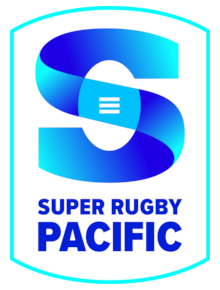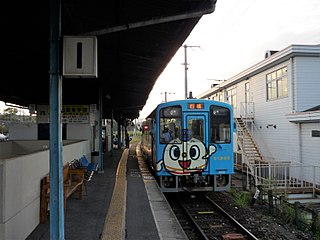
The Men's Rugby World Cup is a rugby union tournament contested every four years between the top international teams, the winners of which are recognised as the World champions of the sport.

Super Rugby is a men's professional rugby union club competition involving teams from Australia, Fiji, New Zealand, and the Pacific Islands. It has previously included teams from Argentina, Japan, and South Africa. Super Rugby started as the Super 12 in the 1996 season with 12 teams from Australia, New Zealand, and South Africa, building on competitions dating back to the South Pacific Championship in 1986. The Super 12 was established by SANZAR after the sport became professional in 1995. After the COVID-19 pandemic forced the competition to split into three, the reformed competition in 2021 only included teams from Australia, New Zealand and the Pacific islands.

The Japan national rugby union team, also known as the Cherry Blossoms, the Brave Blossoms, or simply Sakura, represents Japan in men's international rugby union. Japan is traditionally the strongest rugby union power in Asia and has enjoyed and endured mixed results against non-Asian teams over the years. Rugby union in Japan is administered by the Japan Rugby Football Union (JRFU), which was founded in 1926. They compete annually in the Pacific Nations Cup (PNC) and previously in the Asia Rugby Championship (ARC). They have also participated in every Rugby World Cup (RWC) since the tournament began in 1987, and hosted the event in 2019.
The Japan Rugby Football Union is the governing body for rugby union in Japan. It was formed 30 November 1926, and organises matches for the Japan national team.
Japan Rugby League One, formerly known as the Top League, is a rugby union competition in Japan. It is the highest level of professional rugby competition in the country. The Japan Rugby Football Union created the competition in 2003, by absorbing the Japan Company Rugby Football Championship. The chief architect of the league was Hiroaki Shukuzawa who strongly felt the urgency of improving Japanese domestic company rugby to a professional level which would allow Japan to compete more convincingly at Rugby World Cups.

Chichibunomiya Rugby Stadium is a rugby union stadium located in the Aoyama district of central Tokyo, Japan. It is the spiritual home of Japanese rugby union and the headquarters of the Japan Rugby Football Union. Named for Prince Chichibu, the late brother of Emperor Hirohito, the venue is used mostly for rugby sevens and rugby union matches.

The Japan national rugby league team, nicknamed the Samurais, represents Japan in rugby league football. Japan have played some international competition since 1994. The Japanese National Cup, the JRL domestic club competition, was founded in 1998. In 2021 the season was restarted after a break for COVID with five teams in two divisions, three clubs in East Japan, the Abiko Ducks, Mitaka Spartans and South Ikebukuro Rabbitohs; and two clubs in West Japan, the Kamisenryu Sea Turtles and The Kansai Kaminari.

The Pacific Nations Cup is an international rugby union competition held between Fiji, Samoa, Tonga, Canada, Japan and the United States. First held in 2006, the tournament is intended to strengthen the Tier 2 rugby teams by providing competitive test matches in a tournament format.

The IRB2015 Rugby World Cup was the eighth Rugby World Cup, the quadrennial rugby union world championship. The tournament was hosted by England from 18 September to 31 October. Of the 20 countries competing in the World Cup in 2011, there was only one change: Uruguay replaced Russia. This was the first World Cup with no new teams to the tournament.

The Japan national rugby sevens team participates in competitions such as the World Rugby Sevens Series and the Rugby World Cup Sevens.
The Japan women's national rugby union team are a national sporting side of Japan, representing them at rugby union. The side first played in 1991.

The 2019 Rugby World Cup was the ninth edition of the Rugby World Cup, the quadrennial world championship for men's rugby union teams. It was hosted in Japan from 20 September to 2 November in 12 venues all across the country. The opening match was played at Ajinomoto Stadium in Chōfu, Tokyo, with the final match being held at International Stadium Yokohama in Yokohama. This was the first time that the tournament had taken place in Asia and outside the traditional Tier 1 rugby nations.
The 2001 Wales rugby union tour of Japan was a series of matches played in June 2001 in Japan by the Wales national rugby union team. With their best players involved in the 2001 British & Irish Lions tour to Australia, the squad featured a blend of youth and experience. Although they won just one of their non-test matches on tour, Wales won both tests against the Japan national team.

The Sunwolves – previously known as the HITO-Communications Sunwolves for sponsorship reasons – were a professional rugby union team and Japan's representative team in SANZAAR's international Super Rugby competition. The team was based in Tokyo, Japan, but also played some home matches in Singapore. They made their debut in Super Rugby in 2016. In March 2019, it was announced that 2020 would be the final season for the Sunwolves, after failing to negotiate a contract due to financial considerations.
Dranivesi Baleiwai is a Fijian former rugby union footballer, he played as hooker.

The Tagawa Line is a 26.3 km railway line owned by the Heisei Chikuhō Railway. The line runs west along the Ima River from Yukuhashi to Tagawa, all within Fukuoka Prefecture.
The 1970 Asian Rugby Championship was the second edition of the tournament played in Bangkok, Thailand. Seven countries played round-robin matches in two pools and the first, second, and third place of each pool played placement matches. Japan won the tournament.
David C. Horton is an American former international rugby union player and currently, software developer. He played as a fly-half.










